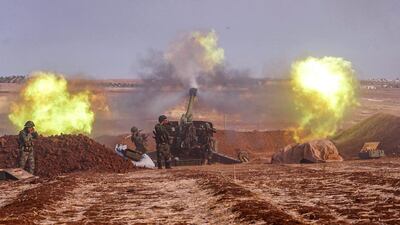There was one key, surprising detail in the now-familiar saga of the killing of ISIS leader Abu Bakr Al Baghdadi in an American special operations raid last weekend.
Al Baghdadi, probably the single most wanted criminal in the world, was not hiding in a redoubt in a forgotten corner of Iraq, where both he and his terror network were born. Nor was he biding his time in the eastern Syrian desert so recently liberated from the clutches of his death cult, which ruled from its self-proclaimed capital of Raqqa for years.
The elusive ISIS chief was hiding in Barisha, a stone's throw away from the Turkish border – in the northern Syrian province of Idlib – which is under the control of Al Qaeda-linked fighters who despise Al Baghdadi's group and its pretentions of a caliphate.
Idlib also happens to be home to three million civilians who are refugees in their own country, dispossessed and subjected over the years to relentless violence. Bashar Al Assad and his backers must not be allowed to use Al Baghdadi’s presence in the area as a justification to launch a final and bloody assault on a region riven by misery.
Let’s take a quick look at what is happening in Idlib. Abutting the Turkish border in north-western Syria, the province is one of two main areas that remain outside the control of the Assad regime, nearly nine years into the war. In addition to Idlib, parts of the north and north-east are under the control of Turkey’s Syrian proxies.
Idlib was initially under the control of an Islamist rebel coalition that had defeated the Syrian military. Slowly, however, these rebels were either ousted or co-opted by a group that came to be known as Hayat Tahrir Al Sham, or HTS, the latest iteration of a group that was affiliated with Al Qaeda.
HTS and ISIS had common origins but turned into bitter rivals over their competing visions for Syria’s fate. Al Baghdadi’s decision to strike out alone and announce the formation of a so-called caliphate split the extremist world between believers in his mission and those who backed Al Qaeda’s project. These fissures were violent and ideological.
HTS remains in control militarily of most of Idlib province, although it is frequently challenged by the vibrant civil society there that has repeatedly protested its hardline rule. Many activists and local journalists have suffered in turn, some even losing their lives in assassinations orchestrated by the militants as they sought to subdue the civil society that emerged as part of the revolution.
Idlib is also home to three million civilians, some of whom have been displaced up to 10 times over the course of the conflict. Most of them are women and children. Throughout the country, Mr Al Assad’s forces and allies negotiated surrender deals that allowed them to forcibly displace civilians to Idlib, re-engineering the demographics of entire regions and creating a centre of misery near the border.
Any major campaign to reclaim the province could lead to a humanitarian catastrophe unmatched during the war. Hundreds of people were killed and dozens of hospitals bombed in four months of fighting earlier this year, until a ceasefire negotiated by Ankara and Moscow was imposed in August. It holds by a thread.
The fact that Al Baghdadi was found in the confines of the province could fuel the Assad regime's narrative that it is battling terrorism, providing it with an excuse to launch a campaign that could lead to a bloodbath and mirror the violence inflicted in other parts of the country, such as Aleppo and Eastern Ghouta, with all the ensuing atrocities and war crimes.
Even on the US side, Brett McGurk, an Obama administration appointee who was the envoy to the anti-ISIS coalition and whose government's policies led to the abandonment of civilians in Syria to a dictator who unflinchingly used chemical weapons, called Idlib the world's "largest terrorist haven" in a Washington Post article. It is typical dehumanising language by US officials who only see the region from the prism of "with us or against us", terrorist or collateral damage.

It is not entirely clear what Al Baghdadi, whose security measures were notorious and involved moving around frequently, with no digital communications, was doing in Barisha. Media reports have suggested that he was en route to another location, or that he wanted to try and rebuild his shattered caliphate from a corner of Idlib, and that HTS was actively searching for him. He was close to the Turkish border and might have hoped to smuggle his family across. We might never know.
The reality is that Idlib represents an intractable problem. And it must be solved peacefully and diplomatically for the good of the civilians there and for the long-term stability of the region, as part of a broader peace settlement in Syria. That remains a distant dream. But the alternative is more tragedy heaped upon misery, in a country that, despite Mr Al Assad’s military victory, remains unstable.
Victory over the terrorist group must not give way to state-sponsored terror, abetted or overlooked once again by the international community. Mr Al Assad and his sponsors must not be allowed to use Al Baghdadi's killing as a pretext for another campaign of violence and destruction.
The ceasefire in Idlib must hold, because the cost in blood of it failing is too high.


